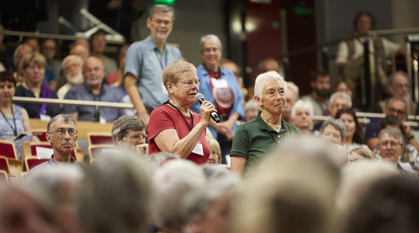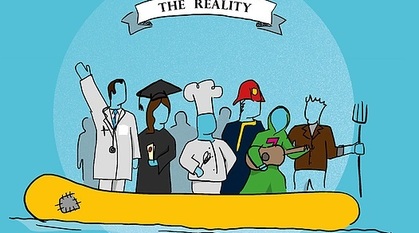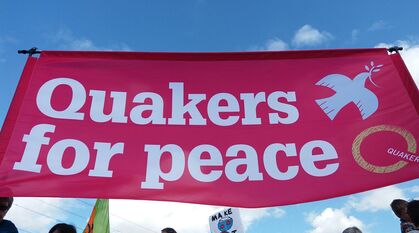Rebuilding society through peacemaking and disarmament
Daniel Jakopovich discusses the urgent need to rethink militarist priorities in order to build back better after the pandemic.

Times of crisis expose existing inequalities and other sources of violence in society. If we are to build a humane, just and sustainable society, peacemaking and disarmament must be our guiding lights.
Governments are expected to protect citizens, yet many avoidable mistakes have been made in the handling of Covid-19 in the UK. The lack of preparedness has been striking, and all the more so considering that pandemics have for years been designated as tier 1 threats by successive National Security Risk Assessments. This, together with inadequate investment in health resources, has contributed to a tragic death toll. Over 150,000 people have died from Covid-19 in the UK – a scale of loss so immense that many have yet to come to terms with it.
Militarist priorities
And yet there was no scarcity of resources when it came to the militarist priorities of those in power. The UK military budget is the highest in Europe, and it was estimated that the cost of replacing the Trident nuclear weapons system will be at least £205 billion. This estimate was made before the recent government announcement that it will increase the number of nuclear warheads by 44%. This retrograde step undermines collective action on nuclear non-proliferation and it directly contravenes the Treaty on the Non-Proliferation of Nuclear Weapons.
The UK government has also decided to increase military spending by £24 billion over the next four years. This is a deeply damaging and worrying decision that will contribute to the global arms race which threatens to spark devastating armed conflicts.
Despite the profound ecological crisis we are in, average annual government spending planned for the period 2021-25 is £47bn for the military, and only about £6bn for reducing UK carbon emissions. The UK government has also announced plans to massively cut international development aid, which would harm some of the poorest people on the planet.
Demilitarising for life
The current Covid-19, economic and ecological crises reinforce the Quaker case for the need to urgently reconsider what it is that brings real peace and security. As engaged citizens we must challenge militarism and these skewed priorities, which make the world less safe and less peaceful.
Instead we need to build a humane, nonviolent and sustainable society that adequately invests in vital public services, in international aid and in the urgent transition to a peaceful, green economy. Resources should be spent on providing things such as renewable energy, peaceful and sustainable jobs, healthcare, education and homes, not bombs.
Demilitarisation could promote everyone's well-being and foster resilience, sustainability and solidarity from the local to the global level. To make this possible peacemakers will need to build and strengthen grassroots alliances committed to creating a peaceful society that will care for everyone. It is possible to find strong points of unity around a common positive agenda that can help create flourishing local communities while also transcending borders.
Resisting fatalism
Militarist and nationalist competition and confrontation between opposed blocs of states are preventing progressive change and locking countries into increasingly violent, authoritarian and militarist arrangements. The rush to develop robot soldiers – including in the UK, where the Chief of the Defence Staff recently said that the British army might have 30,000 robot soldiers by the 2030s – is one particularly disturbing example of this. Other alarming developments include the development of offensive cyberwarfare capacity, of directed-energy weapons and other dystopian weapons, the announced setting up of the UK Space Command, and the deployment of UK troops in the South China Sea.
Peacemakers can resist the fatalism according to which this perilous militarist rivalry is our destiny. If humanity is to survive the challenges of the present and the future, we must move towards greater cooperation and unity. We need to support and strengthen international and transnational cooperation (for example through multilateral institutions, international treaties and cultural exchange) that can serve as the true basis for common security and peaceful coexistence.
Challenging militarism
Many civil society groups are already advancing this cause. This includes the work of the Global Campaign on Military Spending UK (GCOMS UK), which is part of an international network for demilitarisation. GCOMS UK is raising awareness about the connections between militarist violence abroad and structural violence that results from austerity at home, cuts to vital public services and failure to deal with the climate and ecological crisis as a result of militarist and other oppressive priorities. Quakers are playing an active role in this work. This has included participating in a range of activities as part of the Global Days of Action on Military Spending. Quakers have also helped to set up a joint lobbying tool which you can use to call on MPs to challenge the militarisation drive in parliament.
Gandhi once wrote that “full effort is full victory". Nurturing hope, peacemaking, courage and resolve in the present circumstances is a spiritual endeavour. It can also be based on the realisation that the future is not predetermined and that the struggle for peace, justice and ecological sustainability makes the world more liveable.


